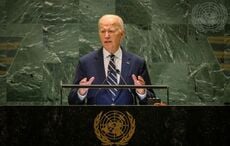An Irish couple have spoken of their devastation when doctors diagnosed their three young sons with the terminal disease Duchenne’s Muscular Dystrophy (DMD) on the same day.
Padraic and Paula Naughton have set up a new trust fund to help with research into DMD, raise awareness of the disorder and ensure their three boys have the full care and resources they need.
Archie, eight, and three-year-old twins George and Isaac were all diagnosed with Duchenne’s Muscular Dystrophy last September.
The Irish Independent reports that the neuromuscular disease is fatal in all cases and there is no treatment or cure.
Speaking from her Roscommon home, mother Paula told the paper, “There was no family history, there were no alarm bells at all.
“We first became concerned in September 2012 when Isaac, then two, was having problems getting up from the floor.
“Archie also had an issue dragging his leg; he had a problem with mobility and all of us and the medical team put it down to the meningitis he had recovered from when he was just two.”
It was only when Isaac began to experience similar difficulties that the Naughtons brought him to a paediatrician who decided to carry out tests on all three boys.
Paula added, “The tests were done on the Thursday and on the Friday we were told they had Duchenne’s Muscular Dystrophy. At that stage, I was 99 percent sure what they were going to say.
“To be honest there aren’t any words to describe how we felt or how we were going to deal with this. Sixteen months on, we’re still unable to find the words.”
Father Padraic added, “We were in a complete state of shock when we were given the diagnosis and we’re still trying to deal with it. Why us, why this terrible news?”
The paper reports that around 20,000 children worldwide are born with DMD every year and 99 percent of these are boys.
DMD is typically diagnosed in children between the ages of three and seven and causes them to be wheelchair bound from the age of eight to 12.
The illness destroys muscle tissue and leaves those with the condition fighting for their lives by their late teens to early 20s.
The Naughtons are now campaigning on behalf of their ‘Join Our Boys’ trust.
Paula continued, “We want to find hope in a situation that could be completely hopeless. For every child with Duchenne’s, the way the disease manifests is individual. The hope is to try and keep as mobile as possible for as long as possible.
“It starts with the ability to walk, and then it will affect the muscles in their arms. It also causes curvature of the spine and the boys will need operations to fix this to help them breathe.”
More information on the trust is available at www.joinourboys.org.




Comments